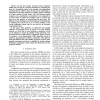Free Online Productivity Tools
i2Speak
i2Symbol
i2OCR
iTex2Img
iWeb2Print
iWeb2Shot
i2Type
iPdf2Split
iPdf2Merge
i2Bopomofo
i2Arabic
i2Style
i2Image
i2PDF
iLatex2Rtf
Sci2ools
129
click to vote
CDC
2010
IEEE
2010
IEEE
Advances in moving horizon estimation for nonlinear systems
In the past decade, moving horizon estimation (MHE) has emerged as a powerful technique for estimating the state of a dynamical system in the presence of nonlinearities and disturbances. MHE is based on the idea of minimizing an estimation cost function defined on a sliding window composed of a finite number of time stages. The cost function usually comprises two contributions: a prediction error computed on a recent batch of inputs and outputs and an arrival cost that serves the purpose of summarizing the past data. The diffusion of such techniques has been hampered by the difficulty in choosing the arrival cost so as to ensure stability of the overall estimation scheme and by the need for an adequate computational time. In this paper, both problems are addressed and possible solutions are proposed. First, by means of a novel stability analysis, we show that in most situations a quadratic arrival cost is sufficient to ensure the stability of the estimation error provided that the weig...
Related Content
| Added | 13 May 2011 |
| Updated | 13 May 2011 |
| Type | Journal |
| Year | 2010 |
| Where | CDC |
| Authors | Angelo Alessandri, Marco Baglietto, Giorgio Battistelli, Victor Zavala |
Comments (0)

